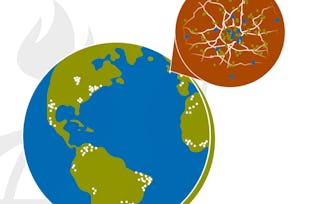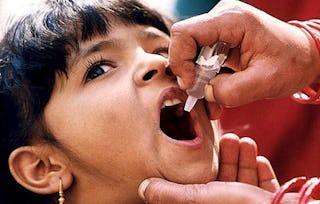Epidemiology is often described as the cornerstone science in public health. Epidemiology in public health practice uses study design and analyses to identify causes in an outbreak situation, guides interventions to improve population health, and evaluates programs and policies.

Gain next-level skills with Coursera Plus for $199 (regularly $399). Save now.

Data and Health Indicators in Public Health Practice
This course is part of Epidemiology in Public Health Practice Specialization

Instructor: Keri Althoff, PhD, MPH
37,400 already enrolled
Included with
(1,227 reviews)
Skills you'll gain
Details to know

Add to your LinkedIn profile
4 assignments
See how employees at top companies are mastering in-demand skills

Build your subject-matter expertise
- Learn new concepts from industry experts
- Gain a foundational understanding of a subject or tool
- Develop job-relevant skills with hands-on projects
- Earn a shareable career certificate

There are 4 modules in this course
In this module, we will introduce the problem solving methodology. This methodology is a powerful tool that can useful when identifying a public health problem, building the case that there truly is a problem, suggesting interventions, and suggestions ways to evaluate the interventions and disseminate the findings of the evaluation.
What's included
11 videos1 reading1 assignment1 discussion prompt
In this module, we dive deeper into what lies at the heart of epidemiology: data! More specifically, we will look at routine and public health data systems.
What's included
9 videos1 assignment1 discussion prompt
In this module we will use data from routine and public health information systems to measure the burden of disease in the population. We will calculate crude mortality rates, and then apply direct and indirect age standardization methods.
What's included
8 videos1 reading1 assignment1 discussion prompt
In this module, we'll discuss health indicators, which are important measurements of the health of a population. There are numerous health indicators that help us paint the picture of a populations health. We'll talk about characteristics of good health indicators to provide a little guidance on how to choose health indicators for the public health problem of interest. Then, we'll use the example of the health indicator of liver cancer incidence to explore descriptive epidemiology. We will stratify liver cancer incidence by person, place, and time, to build our skills in descriptive epidemiology.
What's included
9 videos1 assignment
Earn a career certificate
Add this credential to your LinkedIn profile, resume, or CV. Share it on social media and in your performance review.
Instructor

Offered by
Explore more from Public Health
 Status: Preview
Status: PreviewThe University of North Carolina at Chapel Hill
 Status: Free Trial
Status: Free TrialJohns Hopkins University
 Status: Preview
Status: PreviewJohns Hopkins University
 Status: Free Trial
Status: Free TrialJohns Hopkins University
Why people choose Coursera for their career




Learner reviews
1,227 reviews
- 5 stars
76.77%
- 4 stars
18.09%
- 3 stars
3.50%
- 2 stars
1.14%
- 1 star
0.48%
Showing 3 of 1227
Reviewed on Dec 13, 2019
Excellent introduction to epidemiology and public health, all the topics link together well and provide a good understanding of the public health basics which assist with related study and work.
Reviewed on Feb 8, 2020
Very useful course. Calculations of age adjusted mortality rates is difficult to understand, although very useful to have the Excel sheets.
Reviewed on Feb 26, 2019
Me encantó, es un buen curso introductorio a la salud pública. Te permite comprender los conceptos básicos con excelentes ejemplos. Es muy rápido pero te brinda material por si quieres profundizar.

Open new doors with Coursera Plus
Unlimited access to 10,000+ world-class courses, hands-on projects, and job-ready certificate programs - all included in your subscription
Advance your career with an online degree
Earn a degree from world-class universities - 100% online
Join over 3,400 global companies that choose Coursera for Business
Upskill your employees to excel in the digital economy
Frequently asked questions
To access the course materials, assignments and to earn a Certificate, you will need to purchase the Certificate experience when you enroll in a course. You can try a Free Trial instead, or apply for Financial Aid. The course may offer 'Full Course, No Certificate' instead. This option lets you see all course materials, submit required assessments, and get a final grade. This also means that you will not be able to purchase a Certificate experience.
When you enroll in the course, you get access to all of the courses in the Specialization, and you earn a certificate when you complete the work. Your electronic Certificate will be added to your Accomplishments page - from there, you can print your Certificate or add it to your LinkedIn profile.
Yes. In select learning programs, you can apply for financial aid or a scholarship if you can’t afford the enrollment fee. If fin aid or scholarship is available for your learning program selection, you’ll find a link to apply on the description page.
More questions
Financial aid available,

